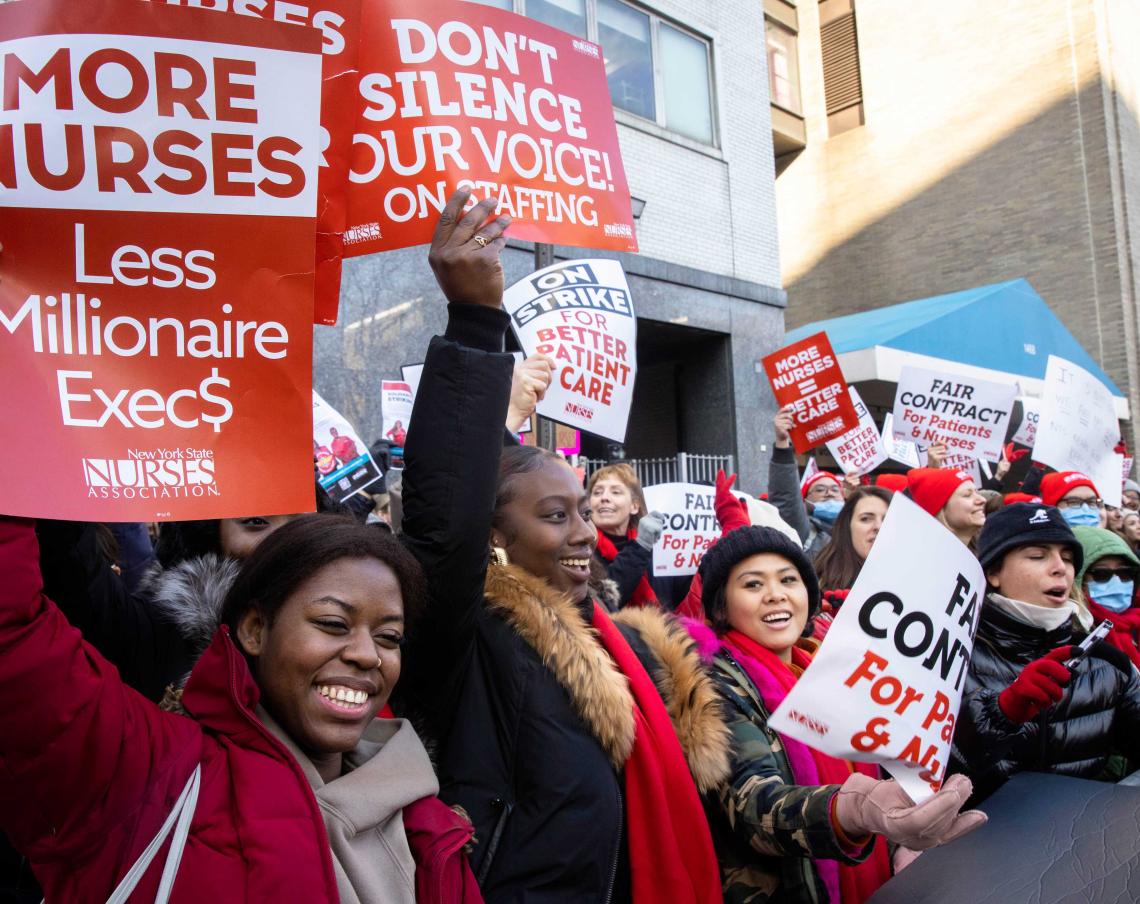Historic New York City Contract Campaign Ends in Groundbreaking Safe Staffing Gains!

On March 23, the NYSNA nurses at One Brooklyn Health Interfaith Medical Center and Kingsbrook Jewish Medical Center unanimously ratified new contracts, bringing the historic campaign of 17,000 New York City private-sector members bargaining on a common platform to an end.
New York City private-sector nurses had been meeting and planning a major joint contract campaign for nearly one year. The campaign was the largest in NYSNA history, mobilizing a record number of members and resulting in groundbreaking gains in safe staffing, protecting benefits, wage increases, health and safety protections, and community benefits. Nurses at two hospitals, Montefiore Medical Center and Mount Sinai Hospital, engaged in a three-day strike in early January that captured the nation’s attention and delivered transformative victories for nurses, patients and the broader community.
Whatever It Takes
NYSNA members at 12 hospitals with contracts expiring on Dec. 31, 2022, were facing cuts to their health benefits and employers at the bargaining table who were more than happy with the status quo of small wage increases and lip service to safe staffing. Frustrated with the pace of negotiations, nurses at 10 of those hospitals voted on Dec. 22 to strike.
The strike vote started a timeline that brought focus to negotiations and pressured hospitals to respect nurses and their demands. Nurses spoke out in the media and gained tremendous public support and recognition for their heroism during the COVID-19 pandemic and the challenging conditions they continue to face.
Served Notice
On New Year’s Eve, with contracts about to expire, NYSNA RNs delivered 10-day notices to strike at eight hospitals, setting into motion what could have been one of the largest nurses strikes in U.S. history. RNs spoke out about the short-staffing crisis that puts patients at risk. They shared stories about their colleagues leaving the bedside and the professional all together because of current conditions. They drew attention to the dangerous working conditions and the need to continue good health benefits for themselves and their families.
New York City private-sector nurses were facing the real prospect of health benefit cuts at the hands of employer trustees of the NYSNA benefit plan that would reverberate beyond New York City to tens of thousands of NYSNA nurses in the state. Employer trustees were unwilling to increase rates to cover the rising cost of our health plan and instead tried to push cuts and costs onto NYSNA nurses. At the bargaining table, employers didn’t want to talk about wages until healthcare costs were settled. That all changed when Wyckoff Heights Medical Center agreed at bargaining to pay whatever NYSNA Plan A would cost. Other hospitals followed suit, and the trustees agreed to increase the amount they pay into the plan to keep our quality healthcare coverage.
With escalating pressure and momentum from the healthcare win, NewYork-Presbyterian was the first hospital to crumble, delivering a tentative agreement that improved staffing standards and enforcement; protected healthcare benefits; and increased salaries by 7%, 6% and 5%, respectively, during the three-year contract period. Several other hospitals soon followed that pattern: BronxCare Health System, Flushing Hospital Medical Center, Maimonides Medical Center, Mount Sinai Morningside and West, Richmond University Medical Center, The Brooklyn Hospital Center and Wyckoff Heights Medical Center.
Montefiore and Mount Sinai Hold Out
Executives at Montefiore and Mount Sinai instead dug in. Mount Sinai’s chief nursing officer insisted often and publicly that there would never be staffing ratios at the hospital. Montefiore bosses claimed it would be impossible to include Emergency Department ratios in the contract or invest in reopening units or preserving community health services. They tried to go on the media offensive, claiming that NYSNA nurses were being unreasonable by not accepting the same wage “deal” that nurses at other New York City private hospitals accepted, failing to realize that union contracts are about more than dollars and cents.
Nurses Strike
At 6 a.m. on Jan. 9, after several marathon negotiating sessions that failed to deliver tentative agreements, nurses at both facilities joined the strike line. Energy was electric, as nurses greeted their co-workers coming off the nightshift with homemade signs, cheers and hugs. There were three picket lines at the Montefiore Bronx facilities, where members kept spirits high with dancing and marching. Dozens of elected officials visited to support the nurses, and the media was a constant presence.
Members kept up the momentum outside for three days and nights from 7 a.m. to 7 p.m. as bargaining committees at both facilities were hard at work hammering out an agreement inside. When the breakthroughs came that ended the strike, nurses gained agreements that included enforceable nurse-to-patient staffing ratios with expedited arbitration and potential financial penalties payable to nurses when employers fail to uphold contractual safe staffing standards. Both facilities improved upon existing staffing standards — in some areas exceeding California nurse-to-patient ratios. More details on the staffing victories at both facilities are available at www.nysna.org. Montefiore nurses won the community benefits and patient care improvements they had gone to the mat for.
When We Fight, We Win
This hard-fought campaign delivered major gains for tens of thousands of nurses — at wealthy academic medical centers and safety-net hospitals alike. Guided by unity and the moral calling to improve patient care, nurses held the line for what was right for their patients and the future of their profession.
Do you have reflections on this contract campaign and the strike that you’d like to share with NYSNA members? Let us know by emailing nynurse@nysna.org.